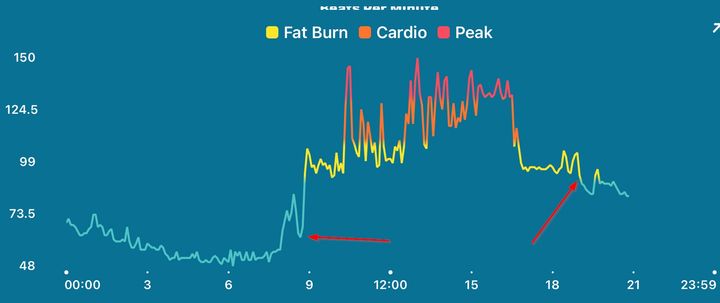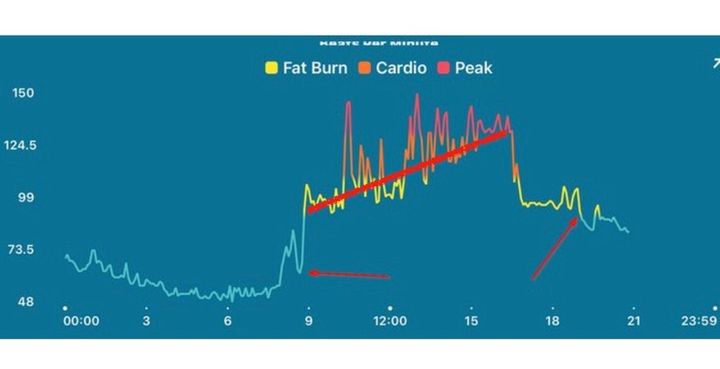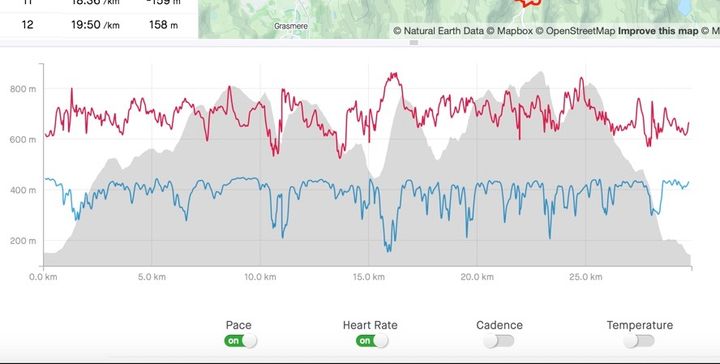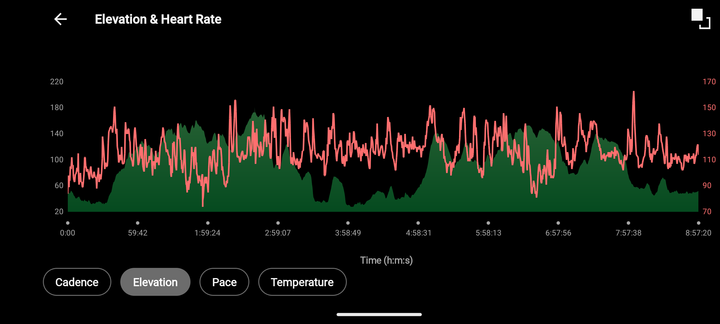Am I overdoing the cardio?
Discussion
At age 58 I do two walks of typically 8-12 miles a week up/down hills and an hour of swimming. That has transformed my fitness BUT I'm curious if I am overdoing it. I appreciate many people run marathons at my age so will immediately say no! But I'm a natural couch potato and resorted to this level of exercise due to high BP, massively overweight and half my close relatives dieing young of heart attacks. I started exercising at this level 4 years ago and would not be at all surprised if my unhealthy fat couch potato life style before that hasn't given me an enlarged heart or blocked arteries etc but better late than never right?
Anyway I did a 18 mile walk a week ago which as usual was up and down lots of horrible hills which I do on purpose to get cardio exercise, but a I overdoing the cardio?
Also I heard that when you stop exercising your speed of recovery says a lot about how fit you are. My speed of recovery seems very slow, in fact hours later my heart bpm hasn't returned to the pre exercise level. Does this mean I'm ferked and it's all to late??!!
See below fitbit graph of bpm. The red arrows show startex/ended. TIA

Anyway I did a 18 mile walk a week ago which as usual was up and down lots of horrible hills which I do on purpose to get cardio exercise, but a I overdoing the cardio?
Also I heard that when you stop exercising your speed of recovery says a lot about how fit you are. My speed of recovery seems very slow, in fact hours later my heart bpm hasn't returned to the pre exercise level. Does this mean I'm ferked and it's all to late??!!
See below fitbit graph of bpm. The red arrows show startex/ended. TIA
Listen to your body, if the long walks feel comfortable then I don't see how it's a problem. The danger comes when you push through discomfort. So your choice of the word 'horrible' hills is a bit of a flag.
The recommended is 3 hours a week of moderate intensity exercise, which kind of means slightly out of breath but not panting. For me that is 120bpm ish but it will vary by person. This should be doable without pushing through any kind of horrible pain barrier. Perhaps you would enjoy more moderate walks more?
The recommended is 3 hours a week of moderate intensity exercise, which kind of means slightly out of breath but not panting. For me that is 120bpm ish but it will vary by person. This should be doable without pushing through any kind of horrible pain barrier. Perhaps you would enjoy more moderate walks more?
Edited by lizardbrain on Thursday 8th August 23:13
I would not read too much into it. At this level and intensity of exercise its very much about how you feel rather than what you see in the heart rate graphs.
Are you tired for days on end? sore muscles which never seem to feel any better? Constantly sleepy or low energy? large heart rate during seemingly moderate activity? things like the classic signs of over training should be monitored and addressed if necessary.
Also, things like heart rate trends can change so quickly when you start exercise (in the order of weeks or months) and then it becomes a battle between cardio or muscular performance.
Above all, congratulations for making these positive changes at the age of 58, that alone must be applauded.
Are you tired for days on end? sore muscles which never seem to feel any better? Constantly sleepy or low energy? large heart rate during seemingly moderate activity? things like the classic signs of over training should be monitored and addressed if necessary.
Also, things like heart rate trends can change so quickly when you start exercise (in the order of weeks or months) and then it becomes a battle between cardio or muscular performance.
Above all, congratulations for making these positive changes at the age of 58, that alone must be applauded.
gamefreaks said:
Mine hangs high (80-90 bpm) for 2-3 hours after strenuous activity.
Don't think it's anything worry about. I'm 40 and perfectly healthy as far as I'm aware.
That's my view, but I have often read that after exercise your bpm should return to normal quite rapidly. I'm fitter than I have ever been but bpm takes hours to return to normal.Don't think it's anything worry about. I'm 40 and perfectly healthy as far as I'm aware.
a311 said:
Regardless of whether you're over doing it or not I'd recommend introducing some form of regular resistance training. There are huge benefits particularly as we age such as maintaining/increasing bone density and warding off things like sarcopenia.
Thanks for the suggestion, I did have a home multi gym at one point with a tv in front of it but found it very boring exercise. The good thing about walking is if I am dropped off ten miles from home I have no choice but to walk home. I'm a natural couch potato so when I was on the multigym I was clock watching and every minute seemed like ten...as an aside, for most part I don't find it useful to watch films etc. zone 2 cardio takes concentration and mental effort, so if I'm watching a movie it can seem harder not easier
zone 1 eg walking is slightly different, but then you don't get the benefit of the higher sustained heart rate
zone 1 eg walking is slightly different, but then you don't get the benefit of the higher sustained heart rate
Scarletpimpofnel said:
a311 said:
Regardless of whether you're over doing it or not I'd recommend introducing some form of regular resistance training. There are huge benefits particularly as we age such as maintaining/increasing bone density and warding off things like sarcopenia.
Thanks for the suggestion, I did have a home multi gym at one point with a tv in front of it but found it very boring exercise. The good thing about walking is if I am dropped off ten miles from home I have no choice but to walk home. I'm a natural couch potato so when I was on the multigym I was clock watching and every minute seemed like ten...Scarletpimpofnel said:
Thanks for the suggestion, I did have a home multi gym at one point with a tv in front of it but found it very boring exercise. The good thing about walking is if I am dropped off ten miles from home I have no choice but to walk home. I'm a natural couch potato so when I was on the multigym I was clock watching and every minute seemed like ten...
That doesn't sound like the resistance training Scarlet was talking about.You would be doing different exercises like squats,bench presses, overhead presses etc.Done correctly with the right amount of resistance you would be concentrating on the lifts and not watching tv 
Scarletpimpofnel said:
gamefreaks said:
Mine hangs high (80-90 bpm) for 2-3 hours after strenuous activity.
Don't think it's anything worry about. I'm 40 and perfectly healthy as far as I'm aware.
That's my view, but I have often read that after exercise your bpm should return to normal quite rapidly. I'm fitter than I have ever been but bpm takes hours to return to normal.Don't think it's anything worry about. I'm 40 and perfectly healthy as far as I'm aware.
The HR return to normal part of fitness is returning to a working level. For example. you are walking on flat ground, you then run hard for 60 seconds and then return to the previous walking pace. The time it takes for HR to return to roughly the level it was before you put in the running effort, is a level of fitness indicator.
What you are seeing in the charts is the heart working harder to replenish used energy, as well as likely digesting food and rehydrating, etc
Exercise physiology  alert
alert
You've walked 18 miles which is probably more than most your age could do. I think your recovery looks OK and if you had included a full 24hours, your heart rate probably would have returned to around the creditable < 50bpm it recorded on the morning of your walk. Although it's entirely normal and unsurprising, your graph shows an obvious trend which no one else has commented on.

There's a clear upward trend in your heart rate during the exercise. I thought I'd dig out one of my own files to see what my heart did over a 30k walk to see if it could be a valid and illustrative comparison. Lo and behold

I was 56 when this file was recorded. This is a pretty chunky day with 2000m of climbing done at a steady pace. What you'll see is my heart rate goes up when there are climbs (and pace goes down) but there is no upward drift in heart rate over the day. Strava gave an average temperature of 24 degrees which isn't cool. My overall average HR is 109 so fairly low. So this is what fit looks like.
Assuming you were not on a walk which got progressively harder and harder or you weren't pushing yourself to go faster and faster, why is your heart working harder and harder as the day goes on with a steady effort level?
1) On a warm day your body will divert blood to the skin for flushing and sweating which puts an extra demand on the heart. Dehydration reduces blood volume and increases heart rate. Managing your temperature with appropriate layering and delayering and keeping hydrated avoids this. In general the body is good at adapting to heat stress but it has to experience it repeatedly to adapt.
2) Pain/Fatigue. Your were experiencing increasing discomfort as the walk went on and the stress caused your heart rate to rise. Again this can be managed by carefully and repeatedly exposing yourself to the same stress
3) Physiological. Your heart and metabolic systems are unable to churn out power for prolonged periods at the a steady state fat burning pace.
This drift is well known phenomenon and can be seen in any athlete knocking out a steady effort at zone 2/conversational pace/ fat burning pace/ sub aerobic threshold pace (it has lots of name but essentially easy cruising). The degree to which the heart rate drifts demonstrates how well you are adapted to low level aerobic efforts. This type of fitness is the holy grail of ultra endurance athletes as the predominant fuel is fat making nutrition easier to manage and keeping the 'top end' energy systems preserved for hard efforts.
In truth it's a combination of all 3 but my money is 3 being the major influence.
Are you doing too much? Without studies like angiography or echocardiogram it's impossible to say. I think, on balance you were subjecting your heart to a fairly significant physiological stress on that day however it's this kind of stress applied consistently and repeatedly which gets you fitter and prevents disease.
FWIW, I dont think there is any chance of you having or getting athlete's heart. Usually these are folk who have done decades of intensive aerobic training.
 alert
alertYou've walked 18 miles which is probably more than most your age could do. I think your recovery looks OK and if you had included a full 24hours, your heart rate probably would have returned to around the creditable < 50bpm it recorded on the morning of your walk. Although it's entirely normal and unsurprising, your graph shows an obvious trend which no one else has commented on.
There's a clear upward trend in your heart rate during the exercise. I thought I'd dig out one of my own files to see what my heart did over a 30k walk to see if it could be a valid and illustrative comparison. Lo and behold
I was 56 when this file was recorded. This is a pretty chunky day with 2000m of climbing done at a steady pace. What you'll see is my heart rate goes up when there are climbs (and pace goes down) but there is no upward drift in heart rate over the day. Strava gave an average temperature of 24 degrees which isn't cool. My overall average HR is 109 so fairly low. So this is what fit looks like.
Assuming you were not on a walk which got progressively harder and harder or you weren't pushing yourself to go faster and faster, why is your heart working harder and harder as the day goes on with a steady effort level?
1) On a warm day your body will divert blood to the skin for flushing and sweating which puts an extra demand on the heart. Dehydration reduces blood volume and increases heart rate. Managing your temperature with appropriate layering and delayering and keeping hydrated avoids this. In general the body is good at adapting to heat stress but it has to experience it repeatedly to adapt.
2) Pain/Fatigue. Your were experiencing increasing discomfort as the walk went on and the stress caused your heart rate to rise. Again this can be managed by carefully and repeatedly exposing yourself to the same stress
3) Physiological. Your heart and metabolic systems are unable to churn out power for prolonged periods at the a steady state fat burning pace.
This drift is well known phenomenon and can be seen in any athlete knocking out a steady effort at zone 2/conversational pace/ fat burning pace/ sub aerobic threshold pace (it has lots of name but essentially easy cruising). The degree to which the heart rate drifts demonstrates how well you are adapted to low level aerobic efforts. This type of fitness is the holy grail of ultra endurance athletes as the predominant fuel is fat making nutrition easier to manage and keeping the 'top end' energy systems preserved for hard efforts.
In truth it's a combination of all 3 but my money is 3 being the major influence.
Are you doing too much? Without studies like angiography or echocardiogram it's impossible to say. I think, on balance you were subjecting your heart to a fairly significant physiological stress on that day however it's this kind of stress applied consistently and repeatedly which gets you fitter and prevents disease.
FWIW, I dont think there is any chance of you having or getting athlete's heart. Usually these are folk who have done decades of intensive aerobic training.
Edited by oddman on Tuesday 13th August 14:29
oddman said:
Are you doing too much? Without studies like angiography or echocardiogram it's impossible to say. I think, on balance you were subjecting your heart to a fairly significant physiological stress on that day but this kind of stress applied consistently and repeatedly is what gets you fitter and prevents disease.
FWIW, I dont think there is any chance of you having or getting athlete's heart. Usually these are folk who have done decades of intensive aerobic training
does the stress on the heart do any damage? Is it the case that the net impact is positive, but this kind of sustained effort introduces harm? FWIW, I dont think there is any chance of you having or getting athlete's heart. Usually these are folk who have done decades of intensive aerobic training
I'm thinking particularly through the lens of CVD and suspectibility to acute events
That post above is very good. I've not a huge amount to add, but have spent years cycling etc, so have a reasonable level of fitness. I actually believe I have athletic heart syndrome, I have an enlarged left ventrical wall, and a resting heart rate of circa 42 when asleep. Can be less than 50 when sat at work. I tend to recover very quickly too.
The upward trend of your heart rate is quite interesting. I can see that in some of my activities occasionally, but usually hard rides as the temperature increases, but not that dramatic. I too did a long walk last year and thought I'd look at my data and didn't notice a measured increase of HR throughout the day (some bouts of gentile running explains the spikes for mine)

The upward trend of your heart rate is quite interesting. I can see that in some of my activities occasionally, but usually hard rides as the temperature increases, but not that dramatic. I too did a long walk last year and thought I'd look at my data and didn't notice a measured increase of HR throughout the day (some bouts of gentile running explains the spikes for mine)
Gassing Station | Health Matters | Top of Page | What's New | My Stuff



